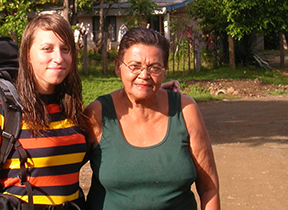|
 Homestays
The majority of our students say with local families, which we arrange for you upon registration. Host families are highly recommended in order to practice what you learn in class with your hosts at home, as well as to integrate yourself into the local culture. Accommodation includes different meal plans, depending on what you prefer. Many different types of host families are available, and we attempt to select the best match for each student. All hosts are carefully screened and must meet NRCSA and the local center's stringent requirements before being accepted as a host family. Host families are middle-class and live in homes and areas that are attractive and safe. Some are single parent families, others are traditional families, still others are multigenerational. The ages of children in the families range from a few years old to adults, or homes without children. Students can choose to have their own room with or without a private bathroom, or to share a room with another student. Students are free to come and go as they please, but need to respect the routine of the family with whom they are staying.
Homestays
The majority of our students say with local families, which we arrange for you upon registration. Host families are highly recommended in order to practice what you learn in class with your hosts at home, as well as to integrate yourself into the local culture. Accommodation includes different meal plans, depending on what you prefer. Many different types of host families are available, and we attempt to select the best match for each student. All hosts are carefully screened and must meet NRCSA and the local center's stringent requirements before being accepted as a host family. Host families are middle-class and live in homes and areas that are attractive and safe. Some are single parent families, others are traditional families, still others are multigenerational. The ages of children in the families range from a few years old to adults, or homes without children. Students can choose to have their own room with or without a private bathroom, or to share a room with another student. Students are free to come and go as they please, but need to respect the routine of the family with whom they are staying.
The families live in small, nearby towns, within a 10 kilometer radius from Tamarindo. These small towns are not on the beach but are close enough. The homes are small and typical. Your family will open the door to the local community, help you interact with them and participate in their tranquil and rural community life.
Families are all screened and carefully selected. You will meet many people from the community, and your host family will try to make your stay unforgettable.
HOMESTAY INCLUDES
Check-in: Sunday around noon, if not otherwise arranged
Room: private
Meals: Breakfast and dinner
Laundry: twice a week
Transportation: Morning transportation to school
Check-out: Sunday before 11:00
The hosts prepare a variety of fresh and tasty meals. The cooking is normally traditional, but if the student has a specific diet or preference, his or her host mother will do everything she can to meet the student's needs. In some houses, the mother cooks on typical mud stoves with wood, and in others, on more modern kitchens but, regardless of the method they use, the meals are well enjoyed by the students. With a host family the students will have the opportunity to taste different fruits and vegetables that could be difficult to find in any other place.
During the months of December to April, local fiestas and dances are part of the entertainment in this and other neighboring towns, where the students can enjoy an afternoon at the rodeo, participate at the tope "horse parade," share interesting conversations or experiences with the locals, or at night, dance to the rhythms of Latin music.
Staying with a host family is a very popular option for those who wish to experience both Spanish Immersion in Costa Rica as well as the local culture.
|

